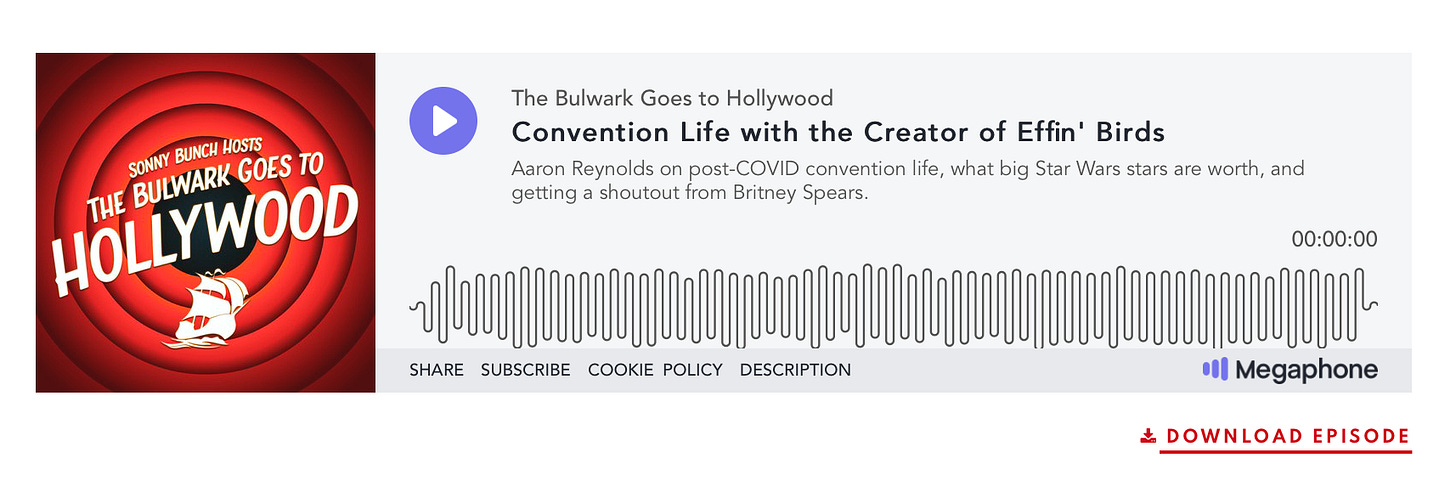Tucked in all the news that new Warner Bros. Discovery chief David Zaslav has decided it’s a better financial move to simply take a huge tax write off on Batgirl by shelving it forever—rather than dumping it on HBO Max or spending mid-to-high eight figures prepping/advertising it for theatrical release—is this tidbit from Matthew Belloni:
I talked to someone who attended a screening and said it played like a CW pilot: low stakes, thin characters, light action, and a twisty, convoluted plot. … That’s not necessarily DC chief Walter Hamada’s fault; he was making the pricey streaming movie that Jason Kilar, the former WarnerMedia C.E.O. under AT&T, and Toby Emmerich, the ex-Warners film chief, told him to make. A $90 million CW pilot was the strategy, not an anomaly, though presumably they asked Hamada to make it a good CW pilot. [Emphasis added.]
Here’s the thing: Lots of people like the CW shows and they played for a long time and presumably made everyone involved a great deal of money. But they did so because they were, by superhero standards, very, very cheap. They looked cheap! Because they were cheap. And their cheapness was acceptable because of the soft bigotry of low expectations for TV shows on the fifth-most-popular broadcast network.
David Zaslav has—rightly I think—decided that their signature franchise property shouldn’t look like complete garbage, which is why he’s decided to risk Warner Bros.’s reputation with talent by throwing the (apparently!) enormous pile of garbage that is Batgirl into the dumpster and pouring kerosene into the dumpster and then tossing a match into the dumpster and walking away from the dumpster as it burns.
Personally, I think this is a mistake, if only for the somewhat selfish reason that I’d like to see a movie that’s so bad a studio chief decides it’s better just to take the tax write off than release it into the wild. All of which is to say that someone should unleash the bots on “Zas the Butcher” and get #ReleaseTheDumpsterFireBatgirlMovie or whatever trending. We’ve done it before, people, we can do it again!
Set the aesthetic concerns aside, however, and what you’re left with is an absolutely insane figure: $90 million is a bonkers amount of money to spend on a two-hour movie that will be thrown into the gaping void of streaming to just sit there, largely unwatched and unloved. Spends like this are the primary reason that streaming is, simply, a black hole of financial loss.
WBD reported a net loss of $3.4 billion on Thursday’s earnings call, this despite the fact that it has 92.1 million subscribers across HBO, HBO Max, and Discovery+. But WBD isn’t alone here. Peacock reported a loss of half-a-billion dollars for Comcast NBC Universal. Despite earning nearly five billion in revenue for Disney, the division of the company that encompasses Disney+, Hulu, and ESPN+ lost nearly $900 million. Whether or not Netflix is “profitable” is hard to say, given how much debt they’ve acquired and how much they’re spending on new programs and movies. But the fact that it’s even a question when the company is generating $30 billion in revenue per year—or, roughly, three times the entire domestic box office for 2019—is a bad sign for streaming as a business model.
There are all sorts of accounting tricks that can be deployed to show these losses aren’t as bad as appears and I’m sure these amortizations are all very convincing to people who “buy stocks” and “run the economy.” But from your humble critic’s point of view, it seems pretty obvious that streaming companies are simply spending too much money on too many middling-to-bad programs and movies. It’s hard to think of a better illustration of this waste than the phrase “$90 million CW pilot.”
Again, even if you don’t think WBD was right to shelve Batgirl, the new regime’s realization that streaming should serve as a, well, stream of revenue that complements, rather than replaces, theatrical revenue is a step in the right direction.
Because I am an idiot, I forgot to link to the player image in my newsletter yesterday highlighting this wonderful interview with Aaron Reynolds, the creator of Effin’ Birds, about the economics of convention life. So I’m going to try again. Click the player below (or click right here!) to listen to the podcast. You’ll never believe the amount of money One Very Big Star Wars Name earns just for showing up to a convention for a day. (Of course, you can always subscribe to the show on Apple or wherever else podcasts are found if you don’t want to have to rely on me remembering to link to the darn thing in my newsletter.)
Links!
This week I reviewed Bullet Train, a movie that calls to mind Snatch, John Wick, and Smokin’ Aces, but isn’t nearly as awesome as that sounds. I really wanted to love this movie! Sadly, I did not love this movie.
On Across the Movie Aisle this week, we talked about The Gray Man, which is another entry in the “this $200 million movie demonstrates why streaming is a black hole of loss” ledger.
Make sure to check out Bill Ryan’s appreciation of the great director/producer Bob Rafelson.
Kind of buried in all the WBD news was Zaslav’s praise for The Flash, which appears to still be on track for a 2023 release. I don’t really have any problem separating the work from the artist, so Ezra Miller’s increasingly erratic and dangerous behavior won’t have an impact on how I watch the movie. But I am once again calling for someone to get that troubled young actor who is being accused of being a cult leader, among other things, some help.
I still think Nope is a bit of a mess, but I really do appreciate how … critical Jordan Peele is of his viewers.
I’m kind of bemused by this piece, titled “A24 Knows How to Get People to Watch Its Films” as it never once mentions … box office? Which is to say that I like a lot of A24 movies, but most of their pictures that get real releases gross between $4 million and $27 domestic. A24 is very good at getting a very small core of people to show up for their movies and buy stuff on their website (including me!), but it’s never really had a true smash hit. Even Everything Everywhere All at Once, a movie I’ve gushed about all year and have been hyped to see succeed, is sitting around $70 million domestic. A good total for a relatively cheap movie! But it’s not exactly putting up Slumdog Millionaire numbers. Compare A24 to their most similar predecessor, Miramax, and you can see the difference. Again: A24 is a good distributor and I like a lot of their movies! But they aren’t filling multiplexes on the reg.
Assigned Viewing: Predator (Hulu)
Both to celebrate the Definitional American Success Story Arnold Schwarzenegger’s 75th birthday and to prepare for the new straight-to-Hulu release of Prey, I’m assigning Predator, also on Hulu. A third reason: Predator is a perfect movie. I don’t mean it’s the greatest movie ever made or anything. I just mean that it’s perfectly paced, has perfect performances, has perfect one-liners, and has perfect action sequences. There’s exactly one imperfection to the picture, and that’s the weird, grainy, shot of Arnold dropping down that waterfall into the lagoon. I don’t know what happened there, maybe they had to use film from a backup camera located a half mile away or something. But the fact that I can remember the single moment of incompetence just demonstrates how excellent everything else in the picture is.






I don’t have streaming for new content. I have it for all the shows I missed over the past three decades while I was young and having a life.
I watched the first 32 minutes of Sandman on Netflix this morning.
I read the comic as it came out. I know it backward and forwards (I still have all the original issues safely squirreled away).
I was NOT disappointed, so far.
THAT is the kind of content that streaming services need to be doing.